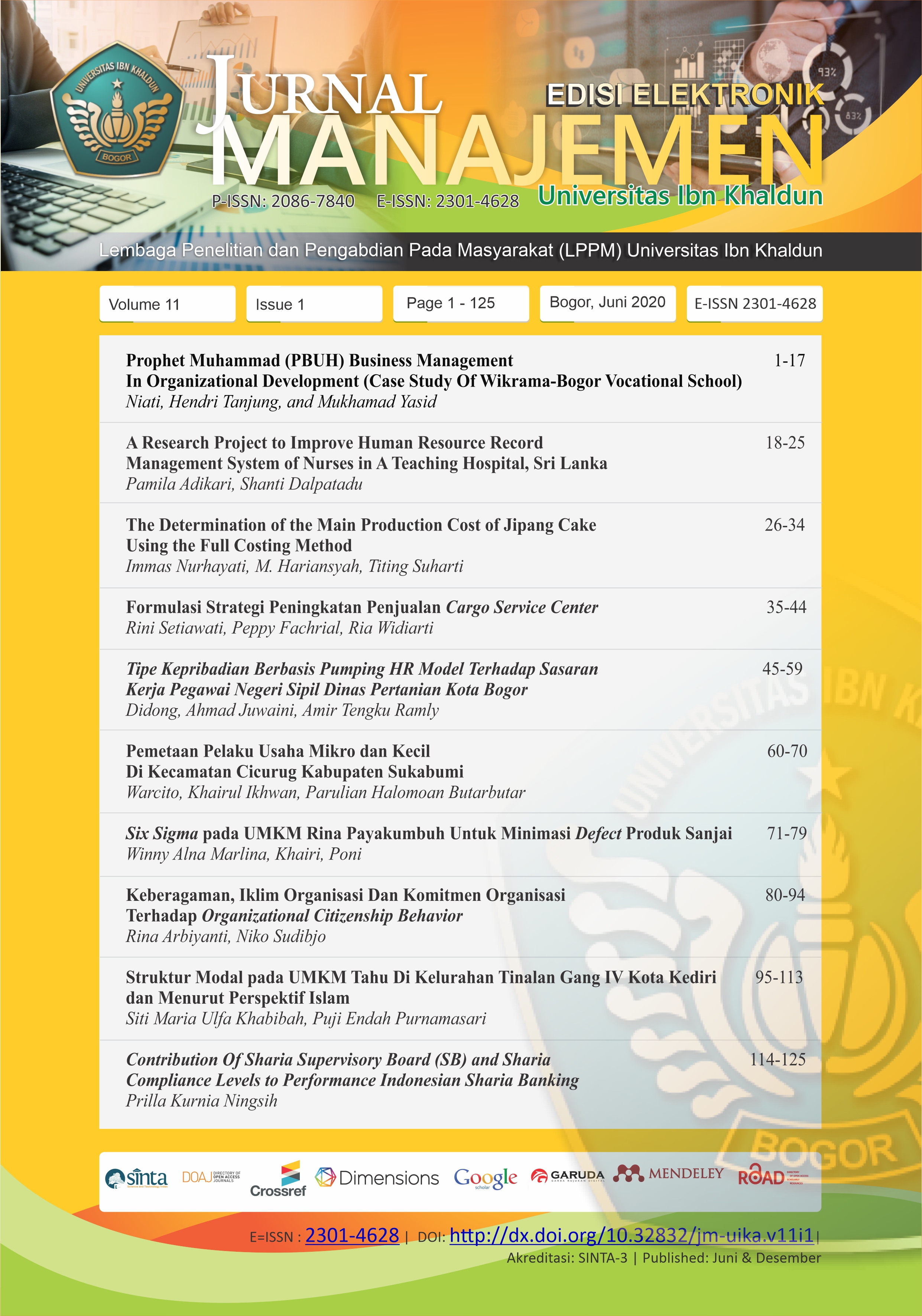Contribution of Sharia Supervisory Board (SB) and Sharia Compliance Levels to Performance Indonesian Sharia Banking
DOI:
https://doi.org/10.32832/jm-uika.v11i1.3039Keywords:
DPS, sharia supervisory board, Islamic banking performance, contributionAbstract
Sharia compliance is an absolute requirement that must be fulfilled by financial institutions that conduct business activities based on sharia principles as a manifestation of the characteristics of Islamic financial institutions. Supervisory Board (SB) contribution oversees and is responsible for ensuring all products and procedures of Islamic banks are by sharia principles. This study aims to measure the ratio of participation, effectiveness and efficiency of the sharia supervisory board to Islamic banking in Indonesia. This study used the AHP method with three indicators; the rate of contributions measured through sharia branch office in public Islamic bank and sharia business unit, to the effectiveness ratio measured by the total productive assets variable in public Islamic and sharia businesses unit, while the efficiency ratio is measured by aggregate variables of operating expenses and labour costs for Islamic public bank and sharia businesses unit. Based on this research, here are some critical result such as the ratio of the overall contribution is useful. The effectiveness ratio shows that the Supervisory Board (SB) is ineffective or not valuable for lending activities in Islamic banks based on Islamic public bank branch offices and sharia businesses unit. And the results for efficiency ratios indicate that overall Supervisory Board (SB) is less efficient for Islamic banks when issuing operational costs on Supervisory Board (SB) contributions.References
References
AAOIFI.1997.Accounting and Auditing Standard for Islamic Financial Institutions. Bahrain.
Abduh, M.Z.2012. Bank Customer Classification in Indonesia: Logistic Regression Vis-Avis Artificial Neural Networks. World Applied Sciences Journal, 18 (7), 933-938
Abidin, Z. 2011. Pengawasan Perbankan Syariah (Studi Pemikiran Muhammad Syafi'I Antonio). Maliyah, 78-94
Ahmed, H. 2014. Islamic Banking and Sharia Compliance: A Product Development Perspective. Journal of Islamic Finance, 3 (2), 15-29
Antonio, Muhammad Syafii, 2001, Bank Syariah dari Teori ke Praktik, Gema Insani, Jakarta.
Badudu, J.S, Kamus Besar Bahasa Indonesia, Departemen Pendidkian dan Kebudayaan (Bali Pustaka, Jakarta:1994) hlm 346.
Bahri, Saiful. Evaluasi efektivitas kinerja dewan/majelis pengawas syariah (studi komparasi DPS bang Muamalat Indonesia dan MPS Bank Islam Malaysia berrhad (tesis, UII, 2006). h.101
Fahmi, Idqan; Daryanto, Arif; Siregar, Hermanto; Harianto. 2012. Prosedur Uji Kepatuhan Terhadap Prinsip Bersaing Islami Pada Industri Perbankan Syariah Sebuah Proposal Berdasarkan Teori Dan Kajian Empiris Organisasi Industri. Jurnal Ekonomi Dan Kebijakan Pembangunan. April 2012, h. 43-61
Gunadi dan Djony. Istilah Komunikasi, Grafindo Persada, (Jakarta : 2013) hlm 76
Guritno,T. 1992. Kamus Ekonomi Jogjakarta: Gajah Mada University Press
Handoko, S. 2013. Analisis Tingkat Efektifitas Pajak Daerah Sebagai Sumber Pendapatan Asli Daerah Kota Pontianak. Jurnal Ekonomi Daerah. h.1-17.
Ika, Siti Rochmah; Abdullah Norhayati. 2011. "A Comparative Study of Financial Performance of Islamic Banks and Conventional Banks in Indonesia,” International Journal of Business and Social Science Vol. 2 No. 15 (August 2011), 199-207
Ilhami, Haniah. 2009. Pertanggung Jawaban DPS Sebagai Otoritas Pengawas Kepatuhan Syariah Bagi Bank Syariah. Jurnal Mimbar Hukum, Vol. 21, no.3, h. 409-628
Komaryatin, Nurul.2006. analisis efisiensi teknis industri BPR di LKS Karesidenan Pati. Jurnal ekonomi dan pembangunan vol.22. no.2 2014.
Kurniawan, Agung.2005. Transformasi Pelayanan Publik.Yogyakarta Pembaruan.H.109. Dalam Jurnal Efektifitas Pengawasan Penerapan Prinsip Syariah Oleh DPS (Refgiani, Devika; Rosyidi, Suherman) Jurnal Ekonomi Syariah Teori Dan Terapan. Vol.3. No.9. September 2016
Mahmudi. 2010. Manajemen Keuangan Daerah Penerbit Erlangga. Jakarta.
Mardian, S. 2011. Studi Eksplorasi Pengungkapan Penerapan Prinsip Syariah (Shariah Compliance) Di Bank Syariah. Jurnal SEBI Vol. 04. No.1
Marimin, Maghfiroh. 2010. Aplikasi Teknik Pengambilan Keputusan Dalam Manajemen Rantai Pasok. IPB Press
Rahman, A.R.2008. Sharia Audit for Islamic Financial Services: The Needs and Challenges. ISRA Islamic Finance Seminar (IIFS) (pp.1-14). Kuala Lumpur: ISRA
Rifai, Moh. 2002. "Konsep Perbankan Syariah”, CV.Wicaksana, Semarang, 2002.
Saramawati, Dedhi Ana Mey; Lubis, Ahmad Tarmizi. 2014. Analisis Pengungkapan Sharia Compliance Dalam Pelaksanaan Good Corporate Governance Bank Syariah di Indonesia. Jurnal Akuntansi Dan Keuangan Islam, No.2
Sudi, Didih Muhammad. Efektifitas DPS Pada Perbankan Syariah. Desertasi UIN Syarif Hidayatullah Jakarta 2015. h.6
Sukardi, Budi. 2012. Kepatuhan Syariah( Sharia Compliance) Dan Inovasi Produk Bank Syariah Di Indonesia. Surakarta: IAIN Surakarta.
Sula, Etik Emilia; Alim, Moh.Nizarul; Prasetyono. 2014. Pengawasan Strategi Antri Fraud Dan Audit Kepatuhan Syariah Sebagai Upaya Preventive Pada Lembaga Keuangan Syariah. JAFFA Vol.02 No.2 Oktober 2014, h. 91-100.
Syafei, A.W.2005. The Responsibility and Independence of Shariah Advisors and the Shariah Review Process in Indonesia Islamic Banks. Master Degree Thesis. Malaysia: IIUM
Syaiful, Watni; Suradji; Sutriya. 2003. "Analisis dan Evaluasi Hukum Tentang Perbankan Syariah di Indonesia”, Badan Pembinaan Hukum Nasional, Jakarta, 2003.
Waluyo, Agus. Kepatuhan Bank Syariah Terhadap Fatwa DSN Pasca Transformasi Kedalam Hukum Positif. INFEFERENSI, Jurnal Penelitian Sosial Keagamaan. Vol.10, No.2 , Desember 2016. H.517-538
Yulianti, R. T. (2009). Manajemen Risiko Perbankan Syariah. Jurnal Ekonomi Islam La riba Vol.03 No.2 .
Downloads
Published
How to Cite
Issue
Section
License
Authors who publish with this journal agree to the following terms:
- Authors retain copyright and grant the journal right of first publication with the work simultaneously licensed under a Creative Commons Attribution-NonCommercial-ShareAlike 4.0 International License that allows others to share the work with an acknowledgement of the work's authorship and initial publication in this journal.
- Authors can enter into separate, additional contractual arrangements for the non-exclusive distribution of the journal's published version of the work (e.g., post it to an institutional repository or publish it in a book), with an acknowledgement of its initial publication in this journal.
- Authors are permitted and encouraged to post their work online (e.g., in institutional repositories or on their website) prior to and during the submission process, as it can lead to productive exchanges, as well as earlier and greater citation of published work (See The Effect of Open Access).











